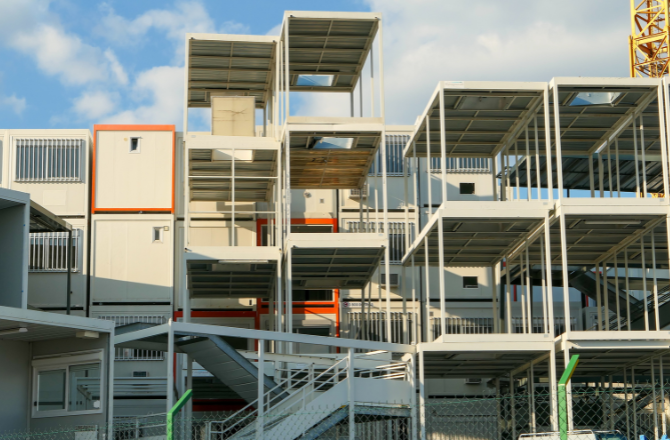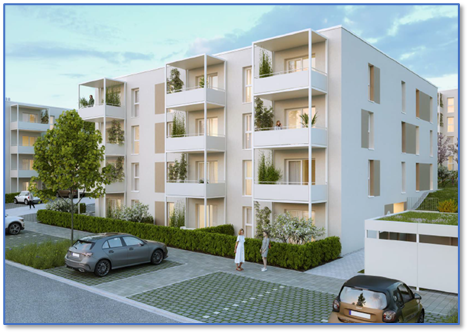We expect rents for new builds and re-letting to increase by an average of 2-3.5% over the next few years, with a difference of 25-50 basis points between new build and existing rents.
The real estate sector continues to record poor figures. Real wages recovered significantly last year, but private consumption remained weak in 2023.
Investments are also expected to make a negative contribution to economic growth in 2024. At the same time, weak foreign demand for capital goods is having a negative impact on German exports. According to forecasts, exports will only grow sluggishly in 2024, while imports will grow more strongly.
Our external contribution is to be saved by measures in the Ministry of Finance under Lindner. Budget consolidation will probably continue as soon as the financing deficit and the debt ratio gradually decline.
What worries us is the loss of competitiveness in some mainly energy-intensive sectors of the German economy. This represents a risk factor for Germany as an industrial location and impairs a sustainable recovery of the economy.

What do we see on the labor market? In 2023, 83.6% of the population aged 20 to 64 were actively participating in the labor market, a record figure. However, this record figure is also characterized by the rapidly growing number of part-time employees, yet the labour market is resilient. This is also reflected in the current unemployment rate, which currently stands at 5.7% and is expected to fall to 5.2% by 2028 over our forecast horizon.
The number of job vacancies stands at just over 700,000, and despite the slowdown in economic activity from its peak of 880,000 in June 2022, it has fallen slightly. Nevertheless, 700,000 is a high figure and remains at a high level. However, the whole issue of the labor market is also influenced by the acceleration of the aging of our society, which is putting pressure on the labor supply and exacerbating the issue of skills shortages.
The shortage of skilled workers is exacerbated by an ageing population and is therefore increasingly becoming a standard risk. This considerably weakens our production potential; concrete effects can be observed, for example, in industry, where not all shifts in production can be filled, or in nursing and kindergartens, where not all beds or places can be filled due to a lack of nursing and care staff. These care services are compensated for by the "sandwich generation", which in turn is then missing from the labor market.
An important driver for the real estate market is, of course, interest rates. You are probably all following the ECB Governing Council's current decisions closely. The key interest rate is currently at 4.5%; there was one meeting in April where the key interest rate was not changed by the ECB. However, what we do know going forward is that inflation in the eurozone is expected to fall from 2.4% in 2024 to 1.9% in 2025 and 2% in 2026.
And this has an impact on the real estate market, with mortgage rates last standing at 4.25% in June 2024, then falling to 4% in October and 3.75% in December 2024. This would be the first step towards a further reduction towards 3% by the end of 2025 and to 2.5% in 2026.



Our three top positive messages that I would like to share with you are:
- The economy is slowly recovering
- Inflation is falling
- The labor market continues to show positive developments.
On the other hand, there are also three top negative news items that I would like to share with you:
- The structural weakness of the German economy due to high production costs and low innovation
- The currently robust labor market, which nevertheless faces major demographic risks.
- The issue of part-time work, not everyone works a full-time job, which increases the shortage of skilled workers and hinders innovation.
With regard to the residential real estate market in Berlin, Munich, Essen and Leipzig, we see a differentiated development depending on the region.
Berlin and Munich have higher rents for new builds and higher purchase prices compared to Leipzig and Essen. Berlin even has the highest average values in Germany. The multiples of purchase prices clearly show the differences.
Finally, for the 2025 forecast, we see stagnation in purchase prices for new construction and possible stagnation or even a decline in existing properties due to legal requirements and modernization needs that are taken into account by buyer groups.
Political measures such as the rent freeze will have an impact on the market.
We expect rents for new builds and re-letting to increase by an average of 2-3.5% over the next few years, with a difference of 25-50 basis points between new build and existing rents.
Rising rents are also influenced by securing demand, limited supply and spillover effects, leading to increased demand in the rental market.
Do you find the topics exciting? Then get in touch with our Immobilien-Webinar Here we discuss trends and developments on the real estate market.
Kind regards Matthias Holzmann
Register HERE for the real estate webinar



